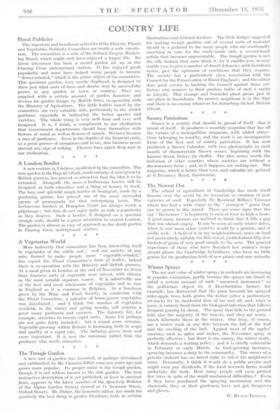Winter Sprays The use and value of winter sprays in
orchards are increasing in popular estimation, partly because the sprays are found to entail a certain amount of such ".unearned increment 7' as the politicians object to. A Herefordshire farmer, for example, has discovered that the grass beneath his sprayed cider-apple trees both grows the better (after a preliminary set-back) for its incidental dose of tar and oil, and,- what is more, is entirely freed from the biological infection that falliaws frequent grazing by sheep. The spray that falls to the ground kills also. the majority of the • insects, and they are many— which hibernate there in the winter. One may, of course,' use a winter wash at any date between the fall of the leaf and the swelling of the bud. Against most of the apples' enemies, such as aphis and sucker, the November spray is perfectly effective ; but there is one enemy, the winter moth, which demands a waiting policy ; and it is chiefly vulnerable in February or early March. As fruit-growing increases.; spraying becomes a duty to the community. The owner of a private orchard has no moral right to infest his neighbour's trees. Personally, I think it would do a public service and might even pay dividends, if the local research farms would undertake the work. How many people will even protect few trees in spite of the small mechanical difficulties ? • Even if they have purchased the spraying mechanism and the chemicals, they or their gardeners have not got dungarees and gloves.
W. BEACI1 THOMAS.














































 Previous page
Previous page